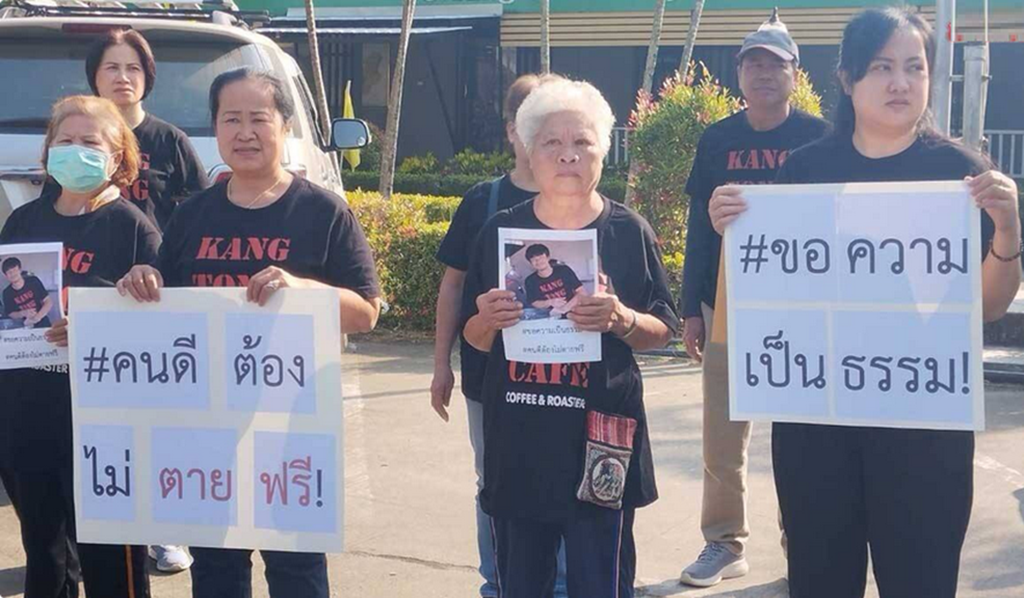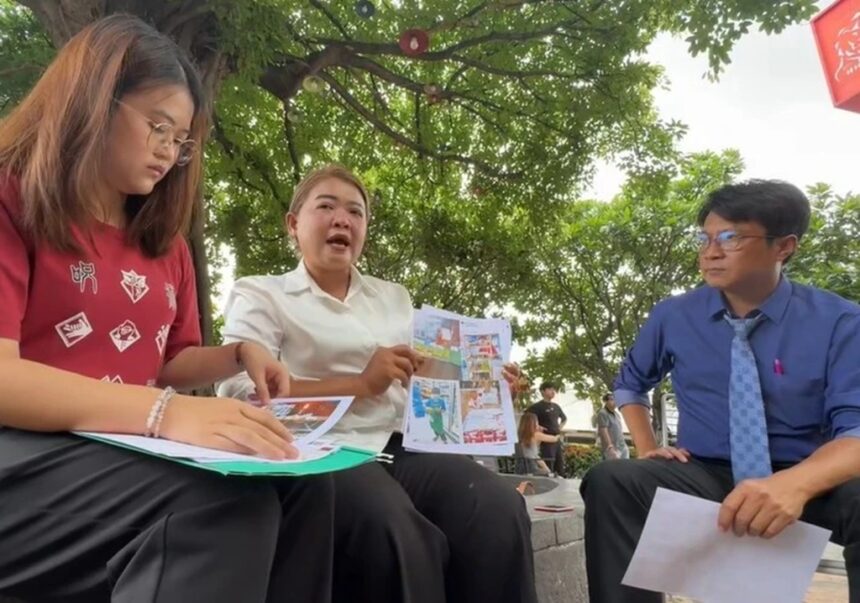CHIANG MAI – A mother in Chiang Mai has called on the media to help her seek justice after her 14-year-old son died in a hit-and-run road accident. The incident involved a deputy director of a public school, who allegedly struck and killed the boy with her car and then drove away.
The case, handled by Hang Dong police, has seen no progress in the past six months. The mother and her lawyer say officials told them the suspect was unavailable, while the prosecutor’s office reports no case file has been submitted.
The family fears the influence of the high-ranking official will lead to injustice.
Ms. Sudjai Donpraisri, age 38, and her lawyer spoke to reporters about her son, Phumipat “Tiger” Donpraisri, who was killed on November 29, 2024. Tiger was riding his motorcycle home from Hang Dong Rat Ratch Uppatham School to help his mother at the market.

Witnesses say a white car blocked the lane, forcing Tiger to swerve and hit the parked car, then fall. At that moment, a black car coming from the opposite direction ran over him. The driver did not stop to check on Tiger or contact the family, nor did she attend his funeral.
The family sought evidence from social media and eventually collected footage from car dashcams and home security cameras. Although not all footage showed the full incident, the evidence confirmed the car’s license plate and owner.
The driver turned out to be a deputy director at a school in San Sai. On November 30, the day after the accident, she appeared at Hang Dong Police Station and gave her statement. She denied running over the boy but admitted her car was involved in the collision.
She claimed her dashcam was not working, but the family later found it recorded after the incident.
The autopsy showed Tiger suffered severe internal injuries, including chest trauma and a fractured skull. These injuries raised doubts about the claim that only a minor collision occurred.

Six months later, the mother has received little information about the case. Police responses were limited to “the hit-and-run investigation isn’t finished” or “the file isn’t ready.” Even after hiring a lawyer to follow up, the family learned from the prosecutor’s office that no case file had arrived.
Repeated questions to police were met with the same replies—that the suspect was not available to meet or give further statements. Normally, police would issue a summons twice and then a warrant if the suspect did not appear. In this case, authorities have continued to wait for the suspect’s convenience.
The mother urges the media to help keep attention on the case. Tiger was a bright and responsible student who helped support the family by selling food after school. He wanted to become a military cadet to care for his mother.
Since the accident, she says, each day is filled with grief and loss. She asks police to act fairly and quickly, hoping justice for Tiger can help bring his spirit peace.

Hit-and-run accidents in Thailand
Hit-and-run accidents resulting in fatalities are a persistent issue in Thailand, often compounded by police corruption and systemic injustice. These incidents, where drivers flee the scene after causing a deadly crash, leave families devastated and highlight deep-rooted problems in law enforcement and judicial processes.
Thailand’s roads are among the deadliest in the world, with over 20,000 traffic fatalities annually, according to WHO estimates.
Hit-and-run cases frequently involve motorbikes, which account for nearly 80% of road deaths, often struck by cars or trucks whose drivers escape to avoid liability. Victims, typically from lower-income groups, are left with little recourse, as investigations are often mishandled or deliberately stalled.
Police corruption exacerbates the problem. Officers are sometimes bribed to tamper with evidence, misreport details, or delay investigations until cases go cold. In rural areas, underfunded police units lack the resources to pursue suspects effectively, while in urban centers, connections to powerful figures often dictate outcomes.
For instance, a 2020 case in Bangkok saw a wealthy driver acquitted after a fatal hit-and-run, with allegations of police accepting payments to alter witness statements. Such incidents erode public trust, with surveys indicating over 60% of Thais believe law enforcement prioritizes elite interests.
Injustice is further entrenched by a legal system that favours the affluent. Prosecutors may drop cases citing insufficient evidence, even when witnesses or CCTV footage exist. Courts often impose lenient penalties, with fines or suspended sentences replacing prison time for those convicted. Victims’ families, lacking financial means or legal knowledge, struggle to navigate this maze, often receiving minimal compensation or none at all.














